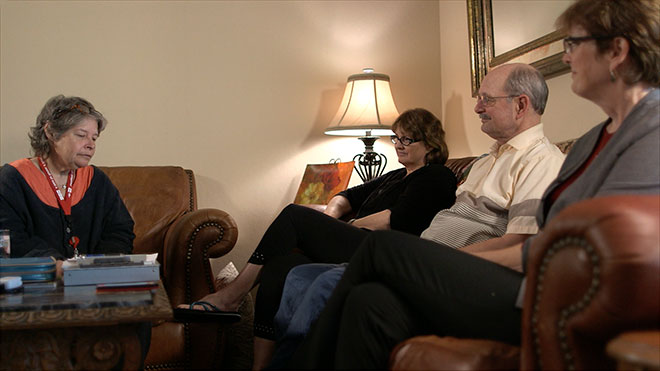Care Team
Family, friends, or hired caregivers take care of you during your final months, weeks, and days of life. Kaiser Permanente’s hospice care team will support your medical, social, emotional, and spiritual needs.

Learn more about the members who make up the hospice care team.
Family, Friends, or Hired Caregivers
Daily hands-on care is performed by family, friends, or hired caregivers. Family members and friends spend time with you and help take care of your personal and simple medical needs.
- Assist with personal hygiene, like bathing, brushing teeth, and toileting
- Support with food preparation and eating
- Help with medication
- Keep you company and monitor your symptoms
- Stay with you around the clock during the advanced stage of your illness
Kaiser Permanente Hospice Care
Made-up of medical and other professionals, the hospice care team provides comfort care with an emphasis on quality of life.
Care team members regularly meet to review, evaluate, and direct your individual care plans. The core team may include a physician, nurse, medical social worker, and spiritual counselor, each with a specific role.

Family and Friends
Often, a person’s family members or friends take care of the patient. One person, sometimes a spouse, adult child, or hired caregiver is the primary caregiver. The primary caregiver takes care of the daily needs of their loved one, communicates with members of the hospice care team, and keeps their loved one company.
Doctors
Your hospice doctors are responsible for your medical care and are in charge of care, such as:
- ordering medications and medical equipment
- arranging hospitalization if necessary to maintain comfort
- working with other physicians, like your oncologist, neurologist or primary care physician
Spiritual Counselors
A spiritual counselor provides cross-denominational spiritual guidance and emotional support for people of all faiths and backgrounds.
You do not need to be religious to benefit from talking with a spiritual counselor. You can decide if you would like to have one visit you at any time.
Home Health Aides
Hospice Aides and Homemaker services can help with personal care, hygiene, and some household tasks to help maintain a safe and sanitary home environment. For a few hours a week or for longer intervals, they can help with bathing or using the bathroom, getting dressed, light housework, or meal preparation. They can also help support family members and friends in their caregiving duties.
Volunteers
Specially trained hospice volunteers can:
- visit to talk or read to you
- provide company
- run short errands or provide a short break for your caregiver
You can decide whether you’d like to have a hospice volunteer visit. Tell your nurse or social worker.
Nurses
The hospice nurse, along with a medical social worker, will coordinate your care, and is your main point of contact with the hospice care team.
Important: your nurse is not there to provide hands-on, day-to-day caregiving – this is performed by family, friends, or hired caregivers.
Your nurse will:
- come to your home about once a week for a short visit, or as needed, for your particular medical situation
- may visit more often if your medical situation changes (for example, to teach your caregiver how to care for new symptoms)
- answer your questions about medical care
- advocate for your needs, including for changes to service, equipment, or medications
- teach your caregivers how to best to take care of you
- work with your doctor to adjust medications, coordinate medical and nursing care
Medical Social Workers
As a trained counselor, your medical social worker may:
- visit your home
- offer emotional and social support to you and your family
- help direct you and your caregiver toward resources, like finding additional caregivers, completing paperwork, memorial or funeral service planning, or referrals to bereavement support.
Other Team Members
- Physical Therapist to assess and teach safety techniques or provide exercises and therapy for symptom management
- Occupational Therapist to help with fine motor movement
- Speech Therapist to help with speech and swallowing issues
- Nutritionist to help with dietary needs
- Clerical support staff to help with paperwork and any hospice administrative needs
- Alternative treatment providers like a massage therapist or acupuncturist.
- Pharmacists to help with the management of pain and other symptoms. They also provide clinical expertise for all medication related needs.
Together, members of the Kaiser Permanente hospice care team will work with you and your hands-on caregivers to help meet your health care needs and keep you comfortable.

